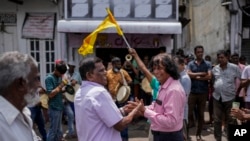Wickremesinghe received 134 votes in the 225-member parliament Wednesday, way ahead of his nearest rival, Dullas Alahapperuma, who won 82 votes.
“Now that the election is over, we have to end this division,” Wickremesinghe said in an acceptance speech in parliament. He urged lawmakers “to join me and work together to bring the country out of the crisis that we are facing.”
Wickremesinghe, a six-time prime minister who never completed any of his terms, comes from a prominent political family and has long coveted the presidency although his two previous bids failed.
Wickremesinghe is seen as a shrewd politician who secured the top job on Wednesday even though his own United National Party was routed in the 2020 parliamentary election. His party has only one seat in parliament.
Wickremesinghe was nominated for the prime minister’s position in May but took over as interim president after Gotabaya Rajapaksa fled the country and resigned. He is seen as close to the Rajapaksas and his victory is attributed to the support of many lawmakers within the ruling Sri Lanka Podujana Peramnua party, which is the biggest party in parliament and dominated by the Rajapaksa family.
After the election, the main opposition leader, Sajith Premadasa, said, “This is now an outdated parliament, with a mandate given for an ousted president.”
Some lawmakers said they had backed Wickremesinghe because his experience could help solve the economic crisis that has bankrupted the country.
The challenges the new president faces are huge; fuel shortages and runaway inflation have made daily life hard for ordinary Sri Lankans in recent months and millions are running short of food.
To get international financial help, he will also need to restore political stability after months of protests that culminated in the storming of his and the former president’s homes and offices earlier this month. Wickremesinghe’s private residence was burned down by a mob.
Political analysts say the election has disappointed a country where tens of thousands led a mass campaign to change the political culture, which led the country into dire economic straits. They see Wickremesinghe as part of the same political establishment.
“It shows that the massive political upheaval during the last four months has had no significant impact on the conscience, decision and behavior of the majority of Sri Lankan lawmakers,” says Jayadeva Uyangoda, a political analyst in Colombo.
“We will again have a government that does not reflect public opinion. The citizens' point of view has not been taken into account.”
Scores gathered outside the presidential secretariat, from where they have been leading the “Aragalaya” movement, named after the Sinhalese word for "struggle." Some expressed fear that the country’s new president could crack down on protests.
On Wednesday, ahead of the vote, security was tightened around parliament with soldiers manning barricades. A nationwide emergency was imposed earlier this week, raising fears that it was meant to target dissenters. Last week, Wickremesinghe referred to elements within the protesters who had clashed with soldiers as “fascists.”
Protesters said stricter security measures would not deter them from pursuing their struggle. “Clearly Wickremesinghe’s election is a violation of the people’s will. We gave a clear picture that we did not just want a regime change, but a system change, and that has not happened,” says Damith Kethaka, who tookn part in the protests. “I think the movement will gain momentum now.”
Political analysts warned that the days ahead could be difficult.
“Unless Wickremesinghe takes radical action to show that he is different from the previous Rajapaksa regime, it will be tough to restore the calm that is needed to secure international financial help for the country,” says Uyangoda.
The election puts Wickremesinghe on course to be president until November 2024, when his predecessor’s term was due to end.
